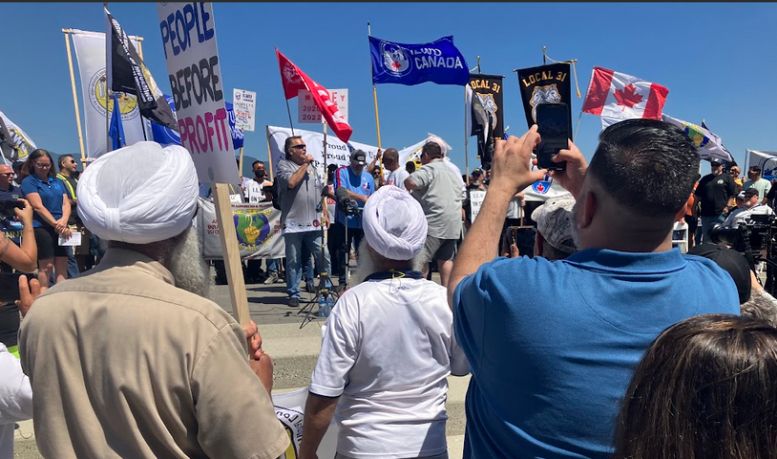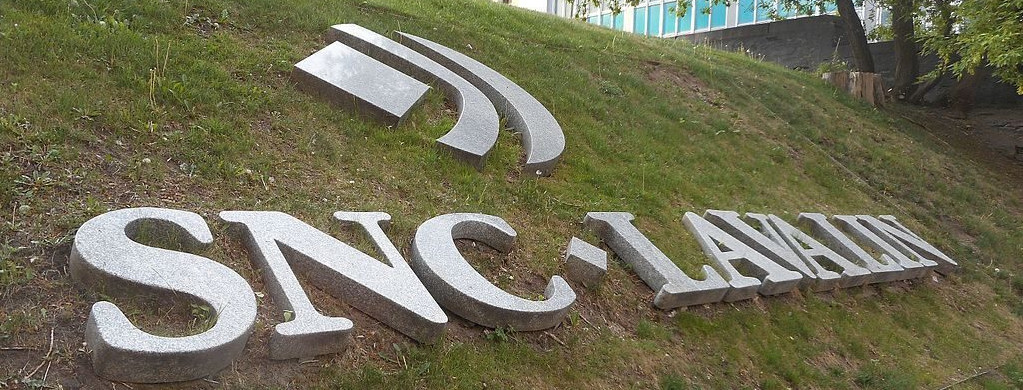Written by Socialist Alternative members in solidarity on the picket line.
What was Won?
The longshore strike on BC’s coast is over. After 12 days of solid action, on the morning of Thursday, July 13, The International Longshore and Warehouse Union Canada (ILWU) and the employers, the BCMEA, announced they had reached a tentative agreement after the intervention of a federal mediator. The details of the agreement have not been made public as the union members discuss it.
The Strike was Winning
A total of 29 ports on the BC coast were closed. ILWU members had voted 99.24 percent in favour of strike action. This solid support was evident on the well-attended picket lines that were up 24 hours every day. The mood was determined and solid.
On Sunday, July 9, thousands gathered in solidarity with ILWU, with members of many unions, along with ILWU, present. One significant group was a strong turnout from the United Truckers Association that represents the owner-operators who move the containers from the port. They were losing money because of the strike but solidly supported it. In 2014 they stood up to the threat of back-to-work legislation and won significant concessions.
There were many powerful speeches about solidarity, class unity and not letting the government interfere in negotiations. Leaders of longshore unions in Australia, New Zealand and the US spoke in solidarity. US ILWU made clear they would not unload any ships diverted from BC ports. This punctured another myth put forward by the employers that business and jobs would be moved to the US because of the strike.
The employers were begging the government to act to force longshore back to work, complaining about the losses. It was estimated the strike cost at least $500 million a day, totalling around $6.5 billion over its duration. The Greater Vancouver Board of Trade complained that 63,000 shipping containers were waiting to be unloaded.
But there was a simple answer for the employers: negotiate in good faith, instead of constantly walking away from negotiations, which is what they did. The employers have no shortage of money. Research by Jim Stanford shows that the “six biggest global shipping lines control 70% of world shipping” and all are members of the BCMEA. The six are MSC, Maersk, CMA CGM, Cosco, Hapag-Lloyd and Evergreen. Five of the six (excluding MSC which does not produce public records) “made over $100 billion in profits in 2022 — up 1500% since 2019.” Some of terminal operators such as DP Canada and GCT also made massive profits. DP Canada is owned by DP-World that fired, probably illegally, 800 workers in Britain to boost profits. A study from the International Monetary Fund states the higher shipping caused 2 percent of inflation in 2022. Profiteering by shipping companies during and after COVID is one more factor boosting inflation, but the government does not criticize the bosses.
Employers’ dirty tricks
Before and during the strike the employers tried to smear the workers. They claimed they were over-paid and greedy. Longshore wages over the last three years increased around 10 percent, while the cost of living increased by nearly double that. Stanford calculated that real wages have fallen 0.4 percent a year since 2017.
It is true that a fully qualified ILWU member makes a good wage, but it takes a lot of training and years of work to become fully qualified.
The employers never talk about their own obscene incomes, made off the backs of the longshore workers. Soren Skou, of Maersk, made $8.5 million in 2022. Robin Silvester, head of the Vancouver Fraser Port Authority until earlier this year, received $1.68 million in 2022. Victor Pang, the port authority’s chief financial officer, collected $851,000 in 2022. Clearly, they are the greedy ones.
Longshoring is a dangerous job that demands hard physical labour, in all kinds of weather and around the clock. It is not sitting in a comfortable chair behind a big desk.
Issues
The main issues are pay, and job security. Jobs are threatened by two trends: contracting out and automation. The employers are keen on automation although it may not improve port operations. It is more about weakening the union. This fight was not only for the existing ILWU members, but for those who didn’t have enough hours of work to be full members and for the next generation of workers: young people and children. There are not enough well-paid jobs in BC for working-class youth, and the employers want to reduce this even more.
The employers are increasingly seeking to contract out maintenance work. As the docks have ever more machinery, the jobs are concentrated more in maintenance and less in physically loading and unloading cargo. Contracting out does not save money — it is more expensive than using ILWU members. The workers’ concerns are twofold. If more work is done by contractors this weakens the union, a key aim of the employers.
Longshoring is a dangerous job. There is risk that contractors, who do not work on the docks permanently and are not part of the ILWU, will be pressured by their employer to cut corners and so endanger other workers’ lives. Most deaths and serious injuries are due to employer negligence and ignoring safety warnings. Socialist Alternative members were told of a worker who, on his very first shift, witnessed a long-standing longshore worker plummet over 100 feet to his death due to an improperly installed walkway. Employers have been fined and criticized but that does not bring a worker back to life.
Federal Interference
The employers only want strikes that are ineffective. The ILWU strike was effective, so from day one the employers and bodies such as the Greater Vancouver Board of Trade called for the government to declare the docks an essential service, thus restricting the right to strike. They obviously never complain about big businesses’ profits made off the backs of workers.
The union movement clearly opposed any back to work legislation. The president of the Canadian Labour Congress and all ten provincial federations sent a letter to Trudeau stating their united opposition to back-to-work legislation.
The federal mediator gave the ILWU and the BCMEA 24 hours to decide whether to accept his proposed settlement. In proposing a four-year contract, the mediator sided with the bosses, not the workers, who wanted a two-year contract. Did the mediator side with the workers on key issues? Does the deal restore the longshore workers’ living standards? Does the deal protect jobs from automation and contracting out? If these are not provided in the deal, then the union leadership should have rejected it.
If the deal does not meet the workers’ needs, there will be opposition. The leadership of ILWU in accepting the deal, if it does not deliver, risks dividing the powerful unity of the members. BCGEU in 2022 recommended accepting a poor deal and 46.64 percent voted to reject it.
What is not clear is what threats were made if the deal was not accepted. It seems highly likely that if the deal was rejected, then the government would impose a new contract. It may not have been back-to-work legislation, but it looks very much like government interference and, in practice, imposing a contract. It may be a different label, but the action is the same.
The lifting of the pickets before the members voted on the new contract makes it harder for them, if they reject the deal, to re-launch the strike as momentum has been lost. It is pre-empting the union’s democracy and the rights of the members.
Could ILWU have defied the government? There is a risk in defying government, but the ILWU had a lot of strong cards. A union’s strength is its membership. The strike was solid — 99.24 percent in favour. The union was promised support from the BC and Canadian labour movement, which could have been mobilized, as was the case against Doug Ford in Ontario in 2022. The government cannot fine 7,400 workers and there are not skilled scabs waiting to take over the longshoring jobs.
The powerful speeches at Sunday’s rally are only words, unless translated into real solidarity action. This solidarity — from the Canadian labour movement to defend the ILWU against the government interference on behalf of the bosses — needs to be clear that Trudeau and Poilievre are friends of big business and Bay Street, not the working class.
Today’s wages and conditions were never given by the bosses. Every step forward was hard fought against the employers’ greed and the rules of the government that defends big business. The strength of the ILWU comes from struggle: the “Bows and Arrows” local over 100 years ago, the murder of longshore worker Frank Rogers in 1903, and the brutal assault of workers at Ballantyne Pier in 1935. The ILWU was born out of the San Francisco General strike of 1934; six workers were murdered in the struggle to win the right to a union. More recently, ILWU leaders were sent to prison in 1966 for refusing to order longshore to work on a public holiday. The power of the union is in the workplace — not the courts.
It has been 30 years since ILWU has been on strike. The employers are awash with money. This strike was because the bosses want to weaken the union so they can make even more money. There is no limit to the greed of the bosses. Only union power can stop them.
If every effective strike is ended by government interference, as happened to Montréal port workers in 2021 and has been used against rail and postal workers in recent years, then in reality there is no right to strike. At some stage, the Canadian labour movement must take a stand against this attack on their democratic rights.
Socialist Alternative
Socialist Alternative fully supported the struggle and demands of the longshore workers. SA members were at the picket line at the start of the strike at 8 am on July 1, and visited the picket line every day. We mobilized in numbers for the rally on Sunday, July 9. This is the third article in support on our website, and the previous two have also been posted on our international website, reaching around the world. We produced a special supplement for our magazine with the headline, Solidarity with ILWU.
A socialist alterative to the privately-run, profit-greedy shipping and port-operating corporations would be a democratic and public ownership of all the port facilities. This would benefit the ports’ workforce and all the workers who live around ports and whose jobs depend on the ports.



